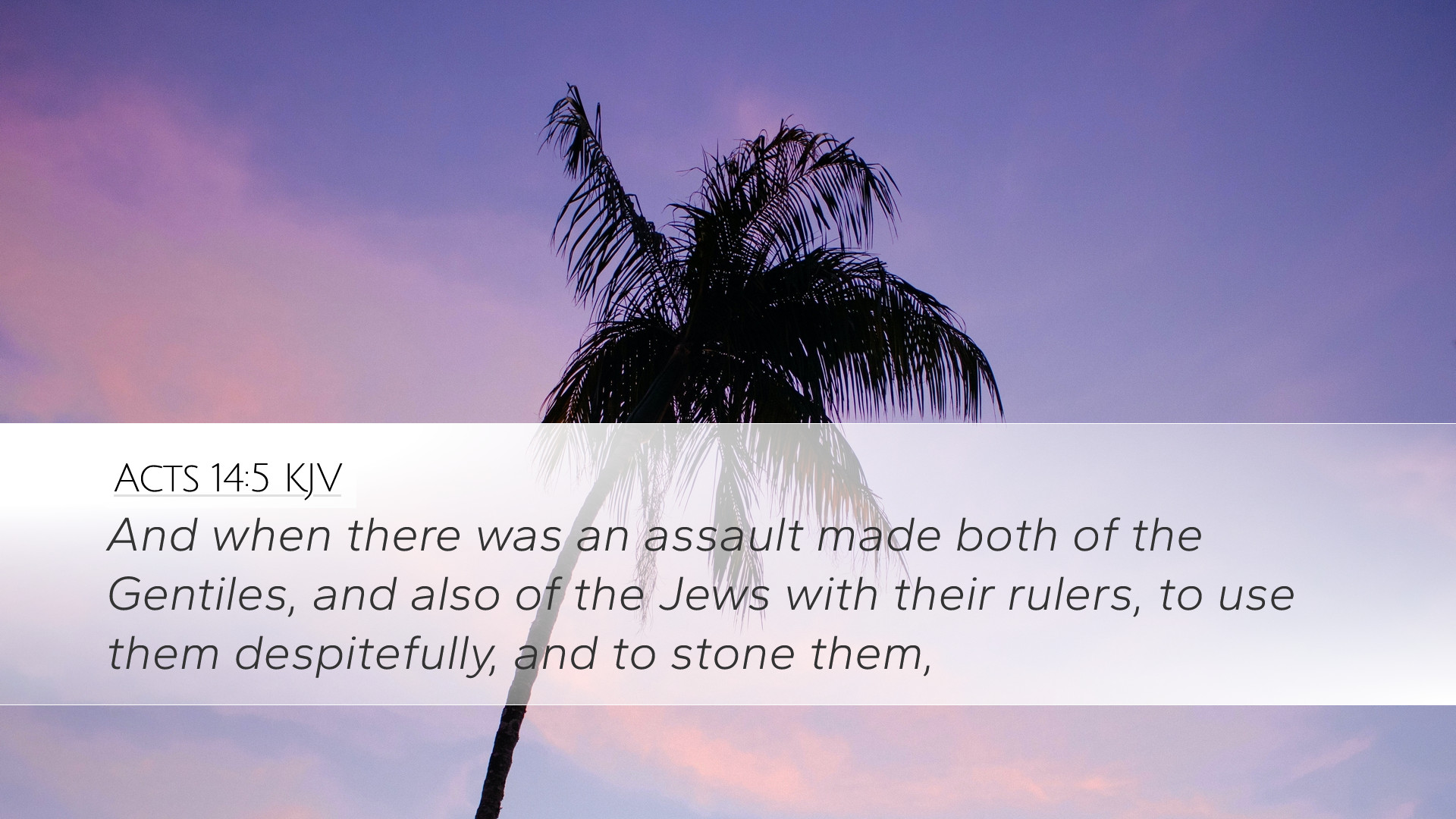Commentary on Acts 14:5
The verse Acts 14:5 says: “And when there was an assault made both of the Gentiles and also of the Jews with their rulers, to use them despitefully, and to stone them.” This scripture highlights a crucial moment in the early Church's missionary efforts, filled with tension between the apostles and the opposing forces who resisted the message of the Gospel. Below, we explore insights from several public domain commentaries, including those of Matthew Henry, Albert Barnes, and Adam Clarke.
Contextual Background
This passage is set within the narrative of Paul and Barnabas's first missionary journey. They were preaching in Iconium, where their ministry attracted both Jewish and Gentile converts but also led to fierce opposition. Understanding the dynamics at play requires a consideration of the socio-religious context of the time.
Insights from Matthew Henry
1. Opposing Forces: Matthew Henry notes that the “assault” made by both Jews and Gentiles indicates a significant unity in opposition. He emphasizes the spiritual warfare aspect, suggesting that the forces of darkness unite against the truth of the Gospel. This serves as a reminder that innovation in God's work often stirs animosity.
2. The Dangers of Ministry: Henry articulates the dangers faced by Paul and Barnabas, showing that faithfulness in ministry often invites persecution. He asserts that the gospel's advancement leads to resistance, as seen in this verse, urging leaders to remain steadfast in their calling despite opposition.
Insights from Albert Barnes
1. The Nature of the Attack: Albert Barnes details the nature of the assault, which he interprets as both a physical and social threat directed at the apostles. He argues that such hostility stemmed from jealousy and the fear of losing influencing and religious authority among the people. The implication is that the proclamation of the Gospel often shakes existing structures and authority.
2. Jewish and Gentile Collaboration: Barnes expounds on the collaborative effort between Jews and Gentiles. He suggests that in issues of greater consequence, adversaries may set aside their differences. This historical observation informs modern readers of how the truth can provoke enmity across cultural lines, requiring believers to stand firm.
Insights from Adam Clarke
1. Verbal Choice and Its Significance: Adam Clarke highlights the phrase “despitefully” in the text, interpreting it as indicative of shameful and ignoble behavior directed at Paul and Barnabas. Clarke urges readers to consider how those in ministry should conduct themselves, as the response of the faithful to unjust treatment is a witness to the power of Christ.
2. The Reactivity of Human Nature: Clarke draws attention to the impulsivity of human reaction through this passage, suggesting that fear and pride often lead to violent responses against truth. His comments prompt reflection on the importance of responding to adversity with patience and faith.
Theological Implications
Acts 14:5 serves as a microcosm of the broader conflict between the Kingdom of God and the world. The varied reactions to the apostles’ message reflect the underlying spiritual warfare, reminding pastors and theologians of the stakes tied to proclaiming God’s truth. The commentary illustrates several themes:
- Persecution as a Common Experience: The early Church faced systemic violence, a reality that persists for many believers today. Understanding these dynamics can foster empathy and deeper engagement with struggling communities.
- The Unity of Opposition: The collaborative hostility between groups signifies the potential for unexpected alliances against Christians. This reality challenges believers to remain vigilant and grounded in God amidst societal upheaval.
- The Role of Faithfulness: Despite the threat of persecution, the commitment of Paul and Barnabas to their mission is a testament to the strength derived from faith. This invites reflection on one's devotion in the face of trials.
Practical Applications
For pastors, students, and scholars, Acts 14:5 bears significant lessons for ministry today:
- Enduring Adversity: The example of Paul and Barnabas encourages perseverance in faith when confronted with opposition. Leaders are reminded to prepare their hearts and minds for similar challenges in their own ministry contexts.
- Responding to Opposition: Clarke’s insights provide a framework for understanding the believer’s response to hostility. Rather than reacting merely in defense, responding with composure and grace can serve as a powerful testimony.
- Recognizing the Spiritual Battle: Engaging in prayer and spiritual warfare is essential, as highlighted by Henry’s commentary. Understanding that what is at stake is not just human authority but spiritual influence can motivate deeper reliance on God.
Conclusion
Acts 14:5 embodies the essence of early Christian mission, revealing the realities of spiritual conflict and the necessity for steadfastness among believers. Insights from Henry, Barnes, and Clarke combine to contribute to a richer understanding of the text, urging modern-day followers of Christ to reflect on their commitment to the Gospel amid a complex and often hostile world.


